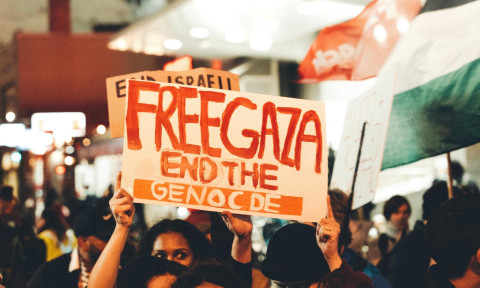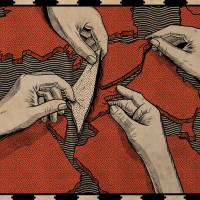Too Little Too Late We need to suspend the EU Israel agreement immediately
Regiones
Israel is committing genocide and ethnic cleansing in Gaza, yet the EU maintains its trade agreement. This double standard exposes Europe's complicity and moral failure. Only an immediate suspension, not a review, can end its support for these crimes.

Mohammed Abubakr/Pexels
“Relations between the Parties, as well as all the provisions of the Agreement itself, shall be based on respect for human rights and democratic principles, which guides their internal and international policy and constitutes an essential element of this Agreement.” — Art. 2 of the EU-Israel Association Agreement.
Yes, ’n’ how many times can a man turn his head
Pretending he just doesn’t see?
— Bob Dylan
For years, Article 2 of the European Union’s association agreement with Israel has served as a rhetorical reminder of Europe’s false commitments to human rights. It establishes that respect for these principles constitutes an essential element of the agreement. Since the agreement was signed in 2000, Israel has never faced any sanctions, despite Israel’s recurrent violations of international law and human rights, including the illegal occupation of Palestinian territory, illegal settlement expansion, and now genocide.
In 2008, more than 100 European organizations called for the suspension of the agreement due to human rights violations in the occupied territories. In 2015, 63 Members of the European Parliament from five political groups did the same following the Israeli offensive on Gaza in 2014. That same year, over 300 entities demanded action from the EU’s High Representative for Foreign Affairs — all to no avail. In 2024, more than 200 organizations are once again calling for the immediate suspension of the agreement. A simple review of the agreement is insufficient. Any other option implies complicity. The EU’s persistent refusal to act reveals a wilful blindness to the ongoing abuses.
While sanctions have been imposed on other countries on account of violations of international law and military aggression, most notably Russia, Israel has always gotten out clean. Clearly, the EU applies double standards in its principles of upholding human rights and international law, showing that trade interests override other interests. The EU is Israel’s largest trading partner and maintains ongoing military relations. But support for Israel’s settler colonial regime is also a matter of shared imperial interests for Europe and the USA, linked to military control and access to resources in the wider region, most notably oil and gas. On 29 October 2023, after starting its genocide in Gaza, Israel issued licenses to six multinational oil and gas companies to explore gas reserves in the Mediterranean Sea, including off the shores of the Gaza Strip.
Box 1.
Arms Exports
Despite official declarations of halting new arms exports to Israel since October 7, 2023, EU countries maintain military ties with Israel.
Germany, Israel's largest European arms supplier, approved €14.5 million in arms exports to Israel between January and mid-August 2024. Italy approved over €1 million in military exports to Israel during the same 2024 period. France has continued to supply parts to Israel that could be used in its own domestic production of arms.
Spain has continued military cooperation through existing contracts and indirect channels. Notably, Spain has awarded Israeli defense companies contracts totalling over €1 billion since that date, including for artillery systems and anti-tank missiles.
These continued military relations underscore the complexity of EU-Israel ties, where official policy statements may contrast with ongoing defense cooperation.
Energy colonialism
The unwavering support from the US and key European nations is not merely a matter of lobbying or influence but is deeply rooted in shared imperial interests and strategic objectives in the Middle East. As Hamza Hamouchene argues, the exploitation of fossil fuel reserves in and around Gaza—such as the licenses granted by Israel to multinational corporations during its bombing campaign—illustrates how energy interests are entangled with settler-colonialism, apartheid, and occupation. These exploration blocks include areas outside Israel’s maritime borders, underscoring the extractivist logic that disregards international law and human life.
What could make this time different is that the European Union can no longer hide behind its rhetoric. Israel stands accused of genocide in Gaza before the International Court of Justice (ICJ), which has ordered urgent provisional measures — and twice reinforced them — to prevent further atrocities. The International Criminal Court (ICC) has gone further still, issuing arrest warrants against Israel's Prime Minister and Defense Minister for alleged war crimes and crimes against humanity. The scale of destruction in Gaza is staggering: tens of thousands killed (or in the hundreds of thousands according to some estimates), entire neighborhoods levelled, and deliberate targeting of civilians, hospitals, and humanitarian aid routes.
Legal experts such as Yusef Al Tamimi and a former lawyer of the European Court of Human Rights argue that the EU has a legal obligation to ensure that its agreements do not contribute to the maintenance of illegal situations, such as the occupation of the Palestinian territories. Continuing with the agreement without addressing these violations could make the EU complicit in breaches of international law.
UN experts have agreed that States have a legal obligation to comply with the ICJ ruling and act upon it, giving 14 very specific measures to take, including to: “Cancel or suspend economic relationships, trade agreements and academic relations with Israel that may contribute to its unlawful presence and apartheid regime in the occupied Palestinian territory."
How Does the Suspension of an EU Association Agreement Work?
The EU doesn’t need a revision to ask for the immediate suspension of the agreement. EU association agreements contain essential clauses stipulating that respect for human rights and democratic principles forms the foundation of the agreement. Breach of these clauses allows the EU to suspend the agreement, in whole or in part. However, critics have repeatedly argued that these human rights clauses have no material impact as they are rarely invoked in trade agreements. There are very few precedents, most of them in Africa. In cases like Syria, the suspension of the Association Agreement, by the Council, in 2011 was linked to specific economic sectors such as oil. A full agreement has never been completely suspended, but measures have been taken. Israel has always been the exception.
These clauses are emblematic of the EU's selective application of international norms—invoked when politically convenient, ignored otherwise. They serve to legitimise expansive economic agreements, while rarely being operationalised to hold partners accountable for systematic rights violations (in both directions). The EU-Israel Association Agreement is a stark example: despite decades of documented violations in the Occupied Palestinian Territories, and now Genocide, article 2 is still not being invoked. This really shows how useless these human rights clauses are.
Yet, the EU continues to promote the idea of "strengthening partnerships" through the inclusion of Human Rights clauses. Let’s be honest though: if a genocide is not enough to trigger the suspension of an agreement, who can take these commitments seriously? These clauses appear toothless—empty declarations that only seem to gain traction when the EU seeks to discipline select countries. Far from ensuring accountability, they risk becoming yet another tool of geopolitical convenience.
In practice, the European Commission can initiate the procedure (by proposing a suspension), but it cannot suspend the agreement on its own — that power lies with the Council, often following a proposal from the Commission, a Member State, or the High Representative (EEAS). For a partial suspension of the agreement, the EU needs 65% of the population’s support. To suspend the whole agreement, unanimity is needed.
That’s why Israel is so confident that nothing will happen, since major countries like Germany and Italy are opposed even to the idea of a review. It’s also unclear whether the countries currently supporting a review would later support a full suspension of the agreement. “I don’t see any change or suspension happening, given the unanimity required from the 27 EU member states,” said Catarivas, president of the Israeli Federation of Bi-National Chambers of Commerce and Industry.
Suspending the agreement could have direct consequences
The EU-Israel Association Agreement, in force since June 2000, provides the framework for political, economic, and trade relations between the two parties. It grants preferential access for Israeli goods to the EU market and vice versa, promoting trade liberalisation and economic integration. As a result, the EU has become Israel’s largest trading partner, with the relationship valued at over €42 billion annually.
If suspended, this could mean halting benefits granted under the agreement, such as trade preferences (tariffs and regulatory barriers), access to public procurement, or specific product agreements. It could hit hard on strategic sectors for Israel such as the technology manufacturing which currently represents 20% of the country’s GDP. In 2024, Ireland was the largest buyer of Israeli integrated circuits, importing around $3 billion worth of electronic integrated circuits and microassemblies, followed by the Netherlands and Germany.
Israel also depends on imported raw materials and components for manufacturing. In 2022, Israel imported approximately $106.3 billion worth of merchandise, with raw materials constituting 43% of these imports. These materials are essential for various industries, including industrial equipment and electronics.
Germany was Israel’s biggest supplier, exporting $5.6 billion worth of goods, including vehicles, pharmaceutical products, machinery, and electronics. Clearly, the EU stands by double standards in the application of the essential clause, where trade interests override other interests.
But beyond concrete measures, Israel’s international image is crucial — which explains its heavy investment in propaganda, such as its presence in Eurovision. Especially now, as even public opinion in Germany appears to be shifting. Thus, the president of the Israeli Federation of Bi-National Chambers of Commerce and Industry called on the government “to explain to the outside world the purpose and objectives of the struggle.” In other words, to rebrand the military offensive and the genocide in Gaza so that they don’t lose money. Thus, suspending the agreement could lead to many different impacts on Israel.
This is why we urgently need to suspend the agreement, not revise
Since the beginning of the attacks against Gaza in October 2023, civil society has asked to suspend the agreement. In February 2024, Ireland and Spain sent a letter to the head of the European Commission, Ursula von der Leyen, requesting an “urgent review” of the EU-Israel Association Agreement and, in case of breach, to propose “appropriate measures.” No mention of the suspension was made, yet still, the European Commission did not even take the time to respond.
What did happen is that the team of then High Representative Borrell commissioned an assessment of compliance with Article 2 to the former EU Special Representative for Human Rights, Olof Skoog. The report compiles data on more than 45,000 deaths in Gaza and repeated human rights violations, but it ultimately led to no concrete action. This 35-page report was sent to Member States ahead of the Foreign Affairs Council meeting on November 18 2024. No measures were taken then, effectively making EU representatives potentially liable for being complicit in war crimes for not having done anything to prevent one single death.
Almost one year later, in early May 2025, the Netherlands—known as an ally of Israel— sends a letter, this time to the head of the European Union's foreign service, Kaja Kallas, requesting a review of the EU-Israel association agreement. Such a move is too little too late, and no guarantee that anything will be done. However, two things deserve closer consideration.
First, in addition to the review, the letter adds that it would withhold support for extending the EU-Israel Action Plan until a formal review of Article 2 of the Association Agreement is conducted. The EU-Israel Action Plan is a framework that guides political, economic, and sectoral cooperation between the EU and Israel under the existing association agreement. It could potentially mean that the Netherlands could block any move to deepen EU-Israel relations under the Action Plan, such as access to EU programs like Horizon Europe, which funds research and innovation. Since October 2023, the EU has approved 130 Horizon Europe projects involving Israeli participation, including funding for the military company Israel Aerospace Industries, which has received over €200,000 for a project running until 2027, according to our research.
Secondly, it does show something until now thought impossible, which is that for the first time there seems to be a consensus to put pressure on Israel, as well as the possibility to implement sanctions. The review request sent by the Netherlands was backed by a majority of 17 EU Member States, including traditionally loyal allies like Austria, supporting what is essentially a basic compliance check on a fundamental principle.1 The UK also announced it will suspend the ongoing trade talks.15 This does show that public pressure is effective, since none of this would have happened without the hundreds of protests, demonstrations, actions, petitions signed by millions of people in the EU.
However, we are still only talking about a revision of the agreement. The member states in question are not demanding a suspension of the agreement, but merely activating a review mechanism – setting in motion a process that could take years to complete without having any real consequences for Israel. And still, resistance is palpable. Germany and Italy, for instance, have shown opposition. With these two big countries against, and even initiators of the review process like the Netherlands uncertain about backing the actual suspension of trade parts, there is a big risk this whole process will be a distraction from actual action.
And this is the real risk: that the Commission opts for a delaying tactic—an “inconclusive” review, a report compiling concerns but issuing no judgment, a round of contacts with Israel serving more to buy time than demand accountability.
If the EU wanted to act, it could simply add the conclusions from both reports of the EU Special Representative (EUSR) for Human Rights and call for the immediate suspension of the Association Agreement—all done in less than 24 hours. This shows even clearer that the review process is most likely a fig leaf.



